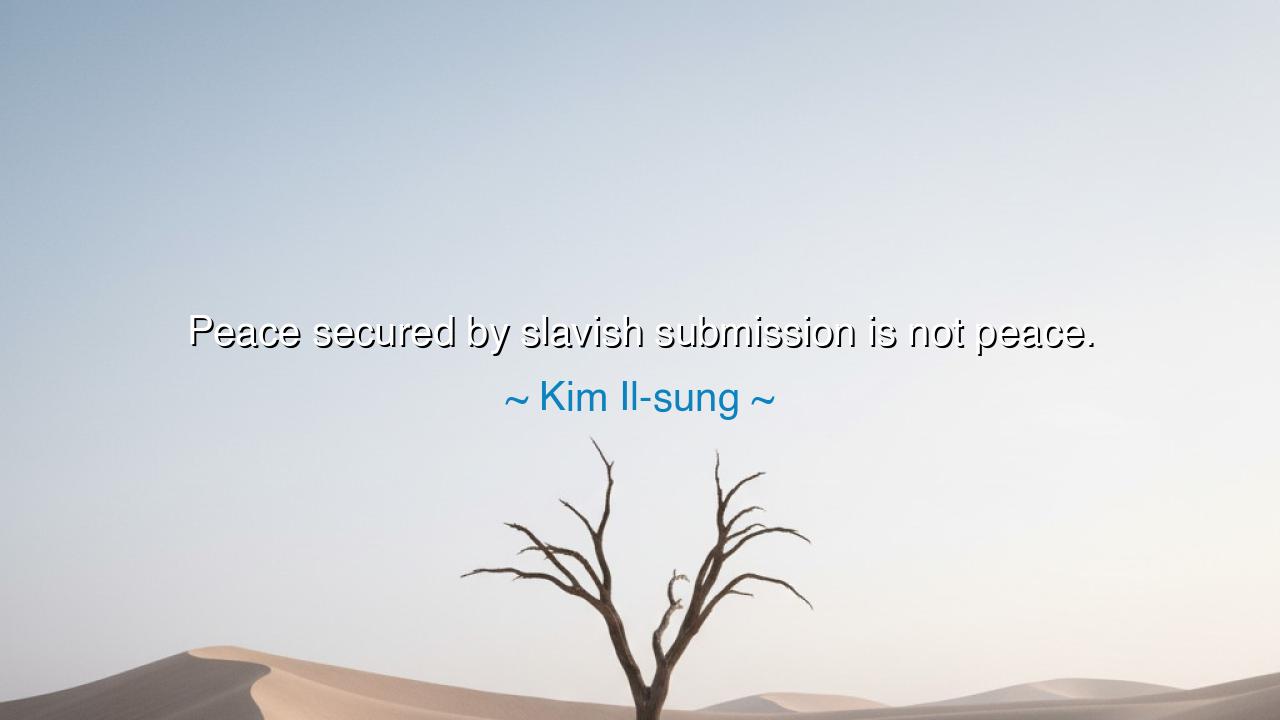
Peace secured by slavish submission is not peace.






Hear the words of Kim Il-sung, spoken with the weight of history behind them: “Peace secured by slavish submission is not peace.” These words cut through illusion, for they remind us that not all calm is noble, and not all silence is sacred. The oppressor may crush rebellion and call it peace, but beneath the surface lies resentment, suffering, and the quiet burning of dignity denied. True peace cannot be forged in chains; it must be rooted in freedom, in justice, and in the unbroken spirit of a people.
The ancients, too, saw this truth. The Greeks told of Sparta’s defiance, when they stood against Persia at Thermopylae. Xerxes offered them safety if they would kneel, but they knew such a peace would be slavery disguised as mercy. Better to die free in battle, they declared, than to live under the yoke of submission. Their sacrifice became eternal testimony: peace is not the absence of war if it is purchased with the death of the human spirit.
History offers us many examples of nations that bowed to tyrants for the promise of stability, only to find that such stability was misery. The Roman Empire subdued lands and declared they had brought "Pax Romana," yet it was peace of the graveyard, a silence forced by legions. In contrast, when Mahatma Gandhi led India’s struggle for independence, he rejected both violence and servile submission. His nonviolent resistance showed that peace without dignity was hollow, but peace born of courage could endure.
Kim Il-sung’s words sprang from a land scarred by colonization and foreign powers. His declaration was not merely political but echoed a universal cry: no people, no soul, should accept humiliation as the price of calm. The storm of resistance may shake the earth, but it carries within it the seed of true peace, one that honors both the living and the unborn. Submission, no matter how quiet, leaves behind the bitterness of chains.
The meaning of this teaching is that slavish submission is a false comfort. It is a mask, a counterfeit peace that rots from within. Those who accept it may escape immediate suffering, but they invite a deeper wound: the loss of dignity, the erosion of self, the slow death of freedom. Better, say the wise, to endure hardship in the struggle for justice than to wear the gilded chains of a so-called peace.
For us, in daily life, this wisdom still applies. How often do men and women silence themselves, endure injustice, or surrender their values for the sake of “keeping the peace”? Yet such peace is no peace at all—it is submission, and it eats away at the soul. In families, in workplaces, in nations, the principle remains: where there is no freedom, where there is no dignity, there can be no true peace.
So, children of tomorrow, take this wisdom as your shield: never mistake silence for peace, nor submission for harmony. Strive for a peace that is honest, a peace that honors dignity, a peace that springs not from chains but from choice. Walk with courage, even when the path is steep, for only those who refuse slavish submission can ever know the radiant freedom of true peace. And let this be your guide: peace is not simply the end of conflict—it is the triumph of justice over fear, and of freedom over chains.






AAdministratorAdministrator
Welcome, honored guests. Please leave a comment, we will respond soon